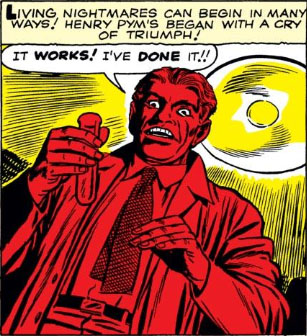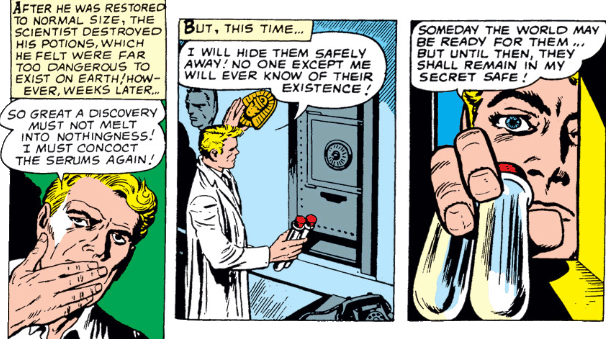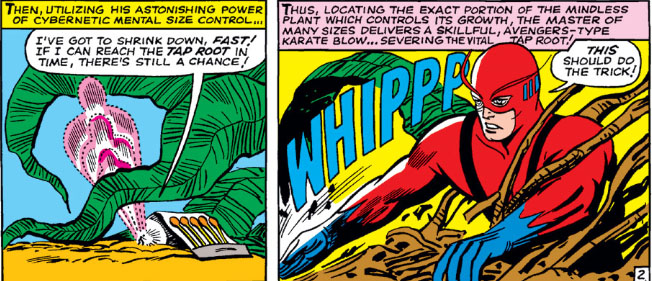OR: "I'll Show You!"
Over the years, while being witness to his colorful and at times unstable career, there's probably one thing we can all reach consensus on when it comes to Henry Pym, a/k/a [INSERT FAVORITE COSTUMED IDENTITY HERE]: his time in the laboratory hasn't exactly been without incident. Put another way: to say that Pym has had his share of mishaps in the lab is like saying that Michael Phelps only picked up a couple of medals in his Olympics sweep. Even before Pym developed the two serums that would alter his life forever, his peers in the scientific community had reached their limit with him, as they tried once more to dissuade him from pursuing his unorthodox experiments and instead apply himself toward more mainstream research.
Given his disturbing response, it seemed clear that Pym's motivations were more self-serving than altruistic.
Nor do you have to look much further than this man's crazed expression following the testing of his shrinking serum to realize that he really shouldn't even be allowed near a bunsen burner, much less a fully stocked lab. Is Henry Pym a scientist more driven than dedicated? A man who strives to break new ground--or one whose methodology in the lab veered toward seeing how bad bad can get?
The shrinking serum that he developed gives us a fair glimpse down Pym's road, when it reaches the point where it's ready to be tested on a living subject. It's pretty obvious that none of his colleagues are about to step up as volunteers, so that leaves himself--but as the man who created this serum and realizes the implications of the end result, his lack of preparation for his safety, to say nothing of returning himself to normal, is (you'll excuse the choice of word) astonishing.
How many factors can we check off as reckless here? Leaving your door wide open, for starters; and fleeing your own lab in a panic doesn't exactly inspire confidence in a scientist who's evaluating his own work. But the grand prize for negligence, of course, is for providing for no means to assist yourself when at a height where everything is out of reach--including your antidote, which is inexplicably left dangling on a window ledge instead of in a test tube rack.
Pym's perilous adventure as "the man in the ant hill" ends with the only ant outside that doesn't want to shred him alive instead ferrying him up the wall of his lab to the window where his (uncapped!) tube of growth serum lies, allowing him to crawl into it and restore himself to normal size. But the experience serves as a wake-up call for him, and Pym resolves to become a more practical researcher. (If not a more responsible one.)
(Since it was already established that the serum works on inorganic matter, it might be confusing how anything could contain the serum without the container itself reacting to it. For instance, how could a test tube of shrinking serum remain at its normal size? On the other hand, Pym does mention that his serums aren't yet perfected to the point of being able to affect any object.)
What we learn later is that it wasn't long before Pym had a change of heart, and decided that he'd go with his own definition of "practical" when it came to his discoveries.
(Never mind the world for now, Hank--it's you who needs to be ready for them!)
Pym goes on to conduct extensive studies on the ant world, and creates electronic means to communicate with them as well as protective clothing designed to shield him. But before his research goes further, he's asked by the government to lead a small team of scientists in developing a gas that makes people immune to radioactivity. But the same forces that led to the creation of the Fantastic Four--those darn commies!--lead Pym to a new calling, when they get word of the project and invade his lab determined to confiscate the research. How fortunate that the government had no problem with a top-secret project being housed in an unsecured location such as Pym's own lab.
This time, Pym has made preparations for his movements at ant-size, and so makes his way outside to gain aid from the ants. There are some rough spots in his initial attempts to bring them under his control--but eventually he meets with success and turns the tables on the armed men who are at a loss as to how to handle a sudden mass of attacking ants (which any of us who do yard work can certainly sympathize with). When things are wrapped up, Pym wonders if he'll ever be "forced" to become Ant-Man again--but nobody forced him to recreate those serums, did they.
Once he joins the Avengers, Pym's lack of foresight and preparation once again give new meaning to the phrase, "accidents will happen"--amended by, "...and you can count on it, if your name is Henry Pym."
Normally, we'd all breathe a sigh of relief at this point if Pym decided to redirect his efforts toward a benign pursuit like horticulture--a little gardening in his back yard tending to his tomatoes is just the ticket to keep the Governor from having the National Guard on stand-by. But Pym's good intentions have a habit of yielding disastrous results (while somewhere, the Plantman is no doubt taking copious notes).
Fortunately, Pym deals with the problem quickly (or so he thinks), though only afterward does he state the obvious in regard to how he proceeded in the first place.
But we can predict by now that an experiment of Henry Pym's isn't so easily controlled.
Shortly after the crisis is averted, Pym heads back to his lab to develop more mischief: creating a weapon that allows him to make other objects shrink or grow from a distance. When he decides to test it on his own cat, he has the nerve to be surprised when his subject reacts with hostility.
Yes, by all means, let's try it again, since your cat is bound to enjoy another exposure this time around. And the additional side-effect you discover in the process serves you right, Mr. Trial-and-Error.
Another crisis averted. But has this man ever taken note of his carelessness before it turns into a problem?
As much as we'd all enjoy seeing Pym get his just deserts in dealing with this new threat, let's move on to the granddaddy of his achievements, a virtual monument to his haphazard method of experimentation. This time, he shifts from biochemistry to robotics--and by his own admission, a "faltering" process of development that results in what would become his greatest failure, as well as a deadly threat to human life.
This latest incident could have easily ended this time with Pym losing his life because of his practice of "leaping before he looked" and what seems to be a pattern of oversight. Fortunately for him, his creation has its own plans for improving on itself--plans that involved subverting Pym's will and forcing him to leave so that the robot could return and make use of the facilities for his own purposes.
Regrettably, when Pym eventually returns to his suburban lab and resumes his work there, he hasn't yet grasped the concepts of focus and safety that any researcher must adopt in order not to become a danger to himself, or to others.
Pym's further work in the lab--an environment he would come to describe as a place "where I'm a failure as a scientist! I hate this place!"--would ultimately lead to his complete breakdown and his expulsion from the Avengers. Ironically, it's in the lab where Pym discovered redemption for himself, and yet another adventurous identity--even eventually going on to become, as incredible as it seems, the Scientist Supreme. Though if he wants some sound advice, "gardener" still has a nice ring to it.
























7 comments:
You know, I actually buy into Pym being Scientist Supreme. Ask yourself - how many Nobel Prizes would he own if he did everything he's done in our real world? He produced a reliable means of shrinking any object or person and restoring them - without blowing them up, Ray Palmer; he discovered methods for communicating with and commanding other species; and he created the world's first truly sentient AI. (Okay, second after the original Torch, and Ultron turned out evil, but still, quite an achievement.) All of his work is reliable and reproducible. Meanwhile, what has Richards invented that isn't more of a one-time thing? Unstable molecules is all I've got - and it had been established that, useful as they are, they're too expensive for everyone to use. And I maintain that Stark, while brilliant, doesn't invent much, he just refines already-extant tech so it's better than before.
Granted that Pym has no sense of lab safety. He's eccentric and borderline crazy. Doesn't make him any less brilliant.
Scientist Supreme.
Wasn't that the title taken by the head of A.I.M.?
Yeah, i could see Pym in that role. This post offers plenty of supporting arguments. Maybe Loki was trying to tell Hank something.
Reed Richards is Scientist Supreme - thanks to him the Fantastic Four had been halfway across the galaxy before NASA had landed a man on the moon.
Maybe the role of Scientist Supreme should be split into two with HP being the Theoretical Scientist Supreme and the position of Practical Scientist Supreme going to someone else. Hank can go anywhere he likes but into a lab.
As for Pym Particles, just think outside the box for a minute. There are many better ways of utilising them than by shrinking yourself.
You make some interesting points, George, but I think they warrant footnotes. The creation of a sentient A.I. is indeed notable, except that Pym doesn't understand how it happened. His "crude" (his word) creation activated itself, while its artificial mind evolved from infancy to adulthood in a matter of seconds, all to Pym's utter surprise. That's like saying someone created a wind-up toy, only to see it become a self-powered mac truck that runs wild. And let's take it a step further: What if I created Skynet, the A.I. that grew out of control and went on to cause the near-genocide of the human race? Should I be lauded for that?
Then there's his shrinking serum, which was never applied in the real world in applications that he'd meant to benefit the country (e.g., items reduced and shipped at a fraction of the cost; whole armies reduced and transported in a single plane)--while his growth serum wreaked havoc with his physiology. His fellow scientists urged Pym to apply his work to more practical, workable solutions--they must have all been shaking their heads sadly as they watched him become someone who cracked under the pressure of becoming a costumed hero and regarded his lab as the root of his failure as a scientist.
While working on my piece on Moon Girl (the real one, not the Janie-come-lately using the name now that's the subject of this quote), i ran into a bit from last year that might have bearing on this conversation:
"Moon Girl will discover she's the smartest person in the Marvel Universe at only 9 years old," said Amanat Sunday, referring to an upcoming story in the planned relaunch of Moon Girl & Devil Dinosaur as part of "Marvel NOW!"
So - how does that affect the equation?
Wow after seeing all this trial and error and what it must have done to his ego and thinking is it any wonder he went nuts in the shooter tale in Avengers #214? ^^
Post a Comment